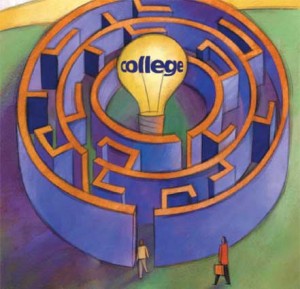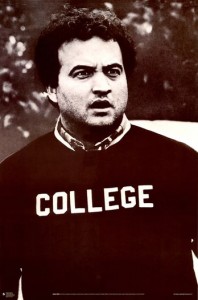So, senior year is hard upon you. That means prom, a top spot in the cheering squad, maybe a full-court press in calc to buff up that transcript. And, of course, it’s time for you and colleges to get serious about one another.
You’ve checked out a few places already. A couple big state universities, a few state colleges – most of the places touchingly within 50 miles or so of home. You’ve probably pored over their websites, talked to folks there and maybe chatted with a teacher, coach or guidance counselor about your options. You and your parents may have checked out finances to figure out what you can afford, perhaps gotten some info about aid and scholarships.
It’s a good start, Sam, but – with any luck – not the end of the game. Let me lob a few thoughts your way. Take these from a grizzled uncle who has been around the academic block a bit, between attending a few schools, teaching at three universities and, most important, seeing three of your cousins go through the same sleuthing sessions you now are involved in.
First, talk to more people. Start with your extended family. At least nine of your cousins have been through the mill already, in undergrad and grad schools. Some went to big, private, urban or suburban schools (Boston University, Columbia, Stanford). Some opted for smaller private schools (Bucknell, Stevens, Pomona). And some chose big public schools (West Virginia, Rutgers, Michigan State, University of Oklahoma). Some went to community colleges for a while. Find out what they liked, what they hated. They’ll tell you, in spades.
Think about your aunts and uncles. Shockingly, they can be helpful and they’d probably talk with you. Their alma maters include Rutgers, Columbia, Colorado State and the University of Toronto, among other places. One is now pursuing a Ph.D. Even if they natter on about goldfish-swallowing, panty raids and ukulele-playing, they might have a few useful pointers to share.
 Visit more places. You must pick up the vibe on a campus to figure out whether you’d like to spend four years and lots of Mom and Dad’s money there. One cousin visited Georgetown and was turned off. Why? The girls dressed like they were at a fashion show or were stalking husbands, not like they were there to learn. Blue jeans, please, and forget the makeup. For her, Harvard’s holier-than-thou attitude was fatal for it. Another thought Berkeley’s refusal to let her stow her luggage in the visitor center for the tour was a killer sign that it wasn’t all that user-friendly. A much smaller, more indulgent school outside LA couldn’t have been more obliging, by contrast.
Visit more places. You must pick up the vibe on a campus to figure out whether you’d like to spend four years and lots of Mom and Dad’s money there. One cousin visited Georgetown and was turned off. Why? The girls dressed like they were at a fashion show or were stalking husbands, not like they were there to learn. Blue jeans, please, and forget the makeup. For her, Harvard’s holier-than-thou attitude was fatal for it. Another thought Berkeley’s refusal to let her stow her luggage in the visitor center for the tour was a killer sign that it wasn’t all that user-friendly. A much smaller, more indulgent school outside LA couldn’t have been more obliging, by contrast.
Think broadly. Why limit yourself to a tiny corner of the country you’ve known all your life? The U.S. is a big place and on- and off-campus life, socially and intellectually, in the South, West and East differ. Want to climb mountains and ski on your weekends? Think about Denver or Fort Collins. Want to learn really good manners? Think about Atlanta. Want to hear people talk funny? Think Boston. Why just New Jersey, Delaware or even Pennsylvania? Sidenote to Mom and Dad: It took us a while to accept the idea of our youngest in far-off California, until we realized it was just a plane ride away, just as Massachusetts and New York were for the other two.
Look at the US News and World Report rankings, but look deeper. Some schools rank high overall but may not be so strong in the discipline that interests you. If you really want to dig into schools, check out the websites for particular departments. Are the faculty distinguished? Indeed, will you ever see the senior faculty or, as often happens, will you be taught by grad students?
 Figure out what you want. Visits are crucial. Big urban schools are great for some folks (one cousin went to a small high school, so wanted thousands of classmates.) Smaller, more intimate colleges are better for others (after a big public high school, another cousin craved a small liberal-arts spot). Want Division One athletics? Could be exciting, but how much time do you really want to spend on the field? Unless you are quarterbacking the football team, it won’t be all there is to life in school (one cousin quit the D1 track team she’d pined for when she learned it meant no other after-school activities and not all that much time for schoolwork). Small fish in big pond or vice-versa – what works for you?
Figure out what you want. Visits are crucial. Big urban schools are great for some folks (one cousin went to a small high school, so wanted thousands of classmates.) Smaller, more intimate colleges are better for others (after a big public high school, another cousin craved a small liberal-arts spot). Want Division One athletics? Could be exciting, but how much time do you really want to spend on the field? Unless you are quarterbacking the football team, it won’t be all there is to life in school (one cousin quit the D1 track team she’d pined for when she learned it meant no other after-school activities and not all that much time for schoolwork). Small fish in big pond or vice-versa – what works for you?
Think about life after class. If you pick a big school, a sorority can make a cold and daunting place more intimate. It can also give you lifelong friends, the chance to learn leadership and offer great academic and social support, not to mention a nice place to live. At a smaller school, the dorms may be just fine.
If you like the idea of a big place, find one that offers “learning communities.” These groups, which bring together like-minded students to study and sometimes live together, make a sprawling campus smaller. You might find lifelong friends there, too.
Sam, there’s a lot more to picking a place where you’ll spend some important years than just popping in on a few nearby campuses. Would you buy the first blouse you see on a rack? Would you limit yourself to just a few stores in the mall? How about the first CD in the bin? (Oh, I forgot. Nobody does that anymore).
Times do change, of course, Sam. But find out what wrong turns (and right ones) others who’ve been down the road have taken. And, whatever you do, shop around. One last thing — don’t sell yourself short. Pick a range of schools, but make sure to aim high. To mix metaphors (something a good English teacher will mark your down for), cast your net wide. Once you’ve applied to a lot of places, you can still go to the school down the block. It won’t move, but in coming months your hopes may.
Love,
Your uncle.

